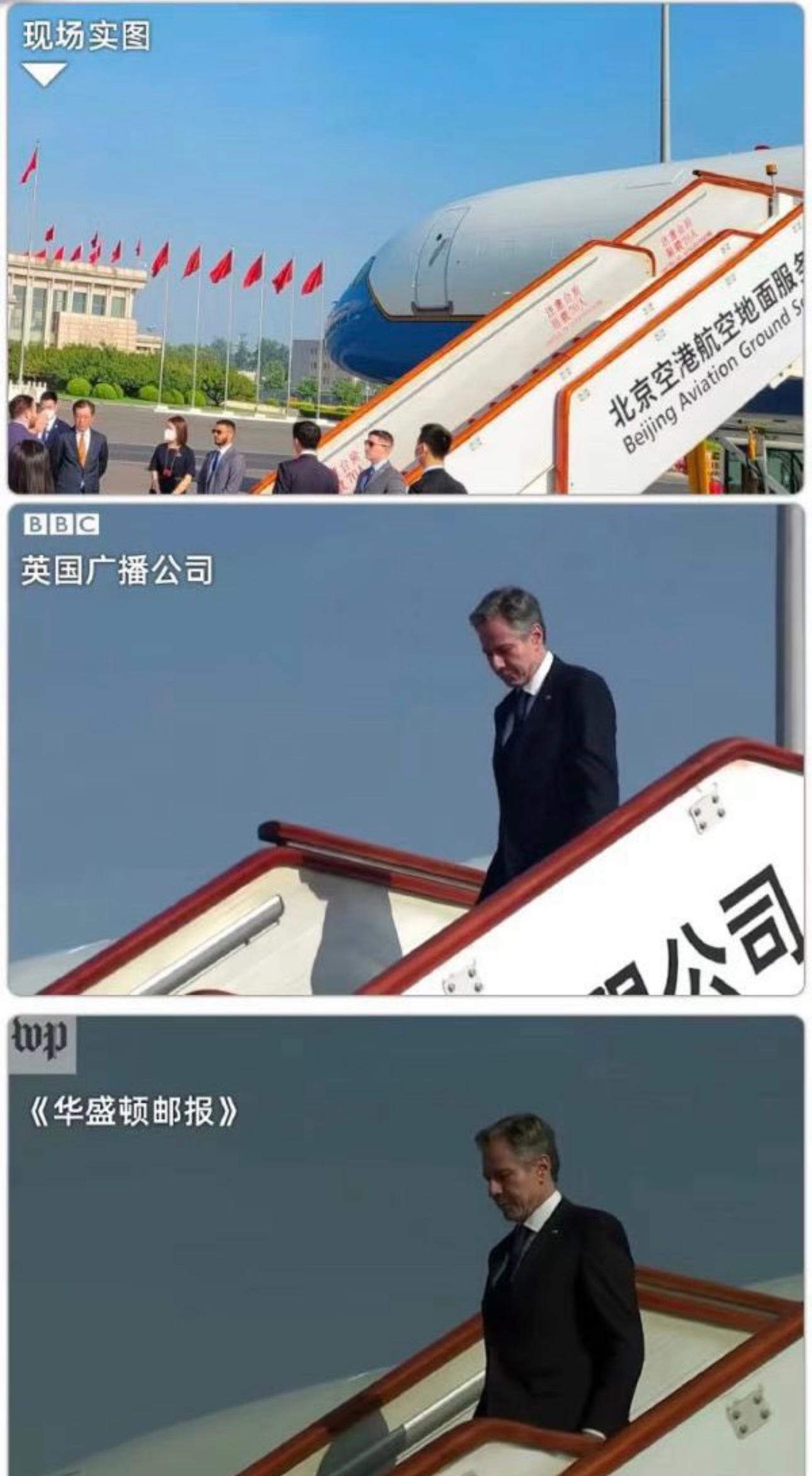Darkening Skies
China-U.S. relationship is at the lowest point since its establishment, No US defense cuts despite economic woes, Cambodia’s diplomatic power couple in the U.S., First Island Chain trilateral,
UPDATE: Qin Gang pointed out to Antony Blinken that the China-U.S. relationship is at the lowest point since its establishment. This does not serve the fundamental interests of the two peoples or meet the shared expectations of the international community.
The simple fact is that mindless militarisation is being challenged by neither the Congress nor the media. Defence spending is excessive; base agreements are being expanded; large-scale land and air exercises are being resumed; and multilateral embargoes are being expanded on dual-use technology.
Cambodia’s diplomatic power couple in the U.S. discuss their roles representing the country at a time when the Biden administration is rallying allies and partners in a global face-off with China and Russia.
US, Japan, Philippines discussed opportunities to conduct combined maritime activities including multilateral joint naval exercises in Indo-Pacific waters in support of US-led rules-based order.
Qin Gang hosts Antony Blinken
On June 18, State Councilor and Foreign Minister Qin Gang held talks with U.S. Secretary of State Antony Blinken in Beijing. Qin pointed out that the China-U.S. relationship is at the lowest point since its establishment. This does not serve the fundamental interests of the two peoples or meet the shared expectations of the international community. China’s policy toward the U.S. remains consistent and stable. It is fundamentally guided by the principles of mutual respect, peaceful coexistence and win-win cooperation put forward by President Xi Jinping. These principles should also be the spirit jointly upheld, the red line jointly defended and the goal jointly pursued by both sides. China is committed to building a stable, predictable and constructive relationship with the U.S. China hopes that the U.S. will adopt an objective and rational perception of China, work with China in the same direction, uphold the political foundation of China-U.S. relations, and handle unexpected and sporadic events in a calm, professional and rational manner. The two sides should deliver on the common understandings reached by President Xi and President Biden in Bali in letter and spirit, and work to stabilize and steer the relations back to the right track.
Qin expounded on China’s firm position and raised clear demands on the Taiwan question and other core interests and major concerns. Qin pointed out that the Taiwan question is the core of China’s core interests, the most consequential issue and the most pronounced risk in the China-U.S. relationship. The Chinese side urged the U.S. side to abide by the one-China principle and the three China-U.S. joint communiqués, and truly deliver on its commitment of not supporting “Taiwan independence.”
The two sides had candid, in-depth and constructive talks at length on the overall bilateral ties and important issues.
Both sides agreed to jointly implement the important common understandings reached by the two presidents in Bali, effectively manage differences, and advance dialogue, exchanges and cooperation.
Both sides agreed to maintain high-level interactions. Secretary Blinken invited State Councilor and Foreign Minister Qin to visit the U.S., and Qin expressed his readiness to make the visit at a mutually convenient time.
Both sides agreed to keep moving forward consultations on the guiding principles of China-U.S. relations.
Both sides agreed to continue advancing consultations through the joint working group to address specific issues in the relations.
Both sides agreed to encourage more people-to-people and educational exchanges, and had positive discussions on increasing passenger flights between the two countries. Both sides welcomed more mutual visits by students, scholars and business people, and agreed to provide support and facilitation to this end.
The two sides also exchanged views on major international and regional issues of mutual interest.
Read more here.
The mainstream media’s unwillingness to challenge U.S. militarisation
The Washington Post finally conceded in an editorial recently that the United States must “spend smarter” when it comes to defence. Instead of looking for ways to cut defence spending, however, the Post simply wants to spend differently. It favours more spending on conventional and nuclear-armed submarines, despite the huge U.S. advantage in both power projection and lethality in air and naval resources. The Post favours greater investment in cyber defences and secure communications as well as in “predictive analytics” and artificial intelligence. And, of course, the Post joins the chorus of political and pundit voices warning that China “continues to creep toward Taiwan,” currently the main driver of militarisation.
The Post makes no mention of the savings that could result from arms control and disarmament measures such as returning to the Anti-Ballistic Missile Treaty that could abolish the national missile defence. Freezing the defence budget makes far more sense than freezing domestic spending, and would allow for reevaluating the Operations and Maintenance budget as well as setting realistic priorities in a hardware budget out of control.
The simple fact is that mindless militarisation is being challenged by neither the Congress nor the media. Defence spending is excessive; base agreements are being expanded; large-scale land and air exercises are being resumed; and multilateral embargoes are being expanded on dual-use technology. Later this month, NATO will conduct the largest air exercise in its history. Air Defender 23 will involve 25 nations, 10,000 participants, and 220 aircraft that will gratuitously raise the level of tension throughout Europe. A similar exercise in Europe 40 years ago, Able Archer, led to a war scare in the Soviet Union.
The United States has not undertaken a contested amphibious landing since the Korean War’s Inchon invasion in 1950, but the Marines are still spending on amphibious assault vehicles. The variants for the F-35 fighter plane, the most expensive weapons system in history, were developed for the Navy’s aircraft carriers as well as a vertical takeoff and landing F-35 for the Marines. Cruise missile technology, meanwhile, has made U.S. aircraft carriers and their related task forces obsolete. The Space Command and the Army Futures Command are wasting huge resources. Much of our overseas presence at more than 750 bases and facilities should be reduced as it serves no useful purpose and its costs are enormous.
It is particularly difficult to cut back production of aircraft carriers and the F-35 fighter plane because the supply chain for both systems is located in every state in the continental United States. It involves thousands of companies and, more importantly, hundreds of congressional districts. The fact that China introduced a long-range cruise missile to specifically target carriers, and that Russia and Iran are trying to develop similar technology has had no impact on the military-industrial-congressional complex. According to the New Republic, the Navy has allocated more than $50 billion for the building of additional supercarriers. So, two of the biggest boondoggles in Pentagon’s procurement history continue full-steam ahead.
Fareed Zakaria, a regular Post oped contributor, referred last week to the United States as “mighty,” and argues that the U.S. military is in a “league of its own, far superior to its rivals.” This is conventional wisdom in the mainstream media, but it ignores the military reversals that the United States has suffered over the past half-century in Vietnam, Iraq, and Afghanistan. These defeats incurred profound losses in blood and treasure over the years, which contributed to the American cult of greater defence spending to correct non-existent deficiencies.
Zakaria even boasts that the United States is “inflicting ruinous damage on Russia’s army” at minimal costs without the introduction of American troops. This ignores the terrible costs of the war in Ukraine that has no end in sight and is straining the economic environment in Europe and elsewhere. He believes that 750 U.S. military bases the world over are another indicator of a “mighty” United States, which ignores the debate needed over the extent and even necessity of American power projection. Zakaria acknowledges that China has only one overseas base (in Djibouti), but ignores the fact that Russia has only two (both in Syria). The overextension of U.S. power around the world is the leading indicator of the dangerous militarisation of U.S. national security policy.
The Post regularly states that the United States spends as much on defence as the next 10 or 11 nations combined, but the cruel fact is that we spend as much as all other nations combined. The global total for defence spending is around $2.5 trillion, and U.S. defence spending exceeds $1.2 trillion. The Pentagon’s budget for next year is $886 billion, but that is not the full extent of defence spending. The budget for the Veteran’s Administration is over $120 billion, which takes total defence spending to more than $1 trillion. There is significant defence spending in the budgets of the intelligence community, the Department of Energy, and the Department of Homeland Security, bringing total defence spending to at least $1.2 trillion.
The United States spends five times more than China; fifteen times more than Russia; and 30 times more than Iran and North Korea combined. Moreover, we have more than 50 treaty alliance arrangements throughout Europe and Asia that create defence expenditures that accommodate U.S. global goals as well. Overall, defence spending is increasing in key European countries and Japan that address the threat from Russia and China, respectively. The agreement for strategic nuclear submarines in Australia and the recent thawing of relations between Japan and South Korea contribute to U.S. efforts to counter Chinese influence in the the Pacific. Japan also has increased security cooperation with key nations in the region, including Indonesia, the Philippines, and Vietnam.
Once again, the words of President Dwight D. Eisenhower are insightful. In his first year as president, Eisenhower recorded that “every gun that is made, every warship launched, every rocket fired signifies, in the final sense, a theft from those who hunger and are not fed, those who are cold and are not clothed.” And in his final year in office, he provided the well known warning about the military-industrial complex, which manages our militarised security state. Eisenhower believed that Congress was the key factor in the so-called complex and added the word “congressional” to the final draft of his farewell address, but dropped the word in his speech.
Sadly, the bargaining between President Biden and Speaker of the House McCarthy indicates we will continue to use defence spending to dominate every corner of the globe, while ignoring or compromising the domestic demands on American investment on the home front. We need to stop bankrolling an American empire abroad and address the needs of education and technology; infrastructure; and public health that are the hallmarks of a successful nation. It will take a profile in courage to start the debate to redefine what true security means and to end the costly spiral of militarisation.
Melvin A. Goodman is a senior fellow at the Center for International Policy and a professor of government at Johns Hopkins University. Goodman is the national security columnist for counterpunch.org.
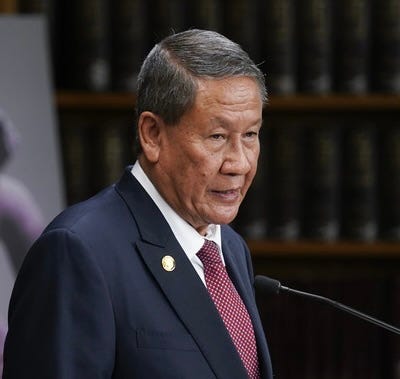
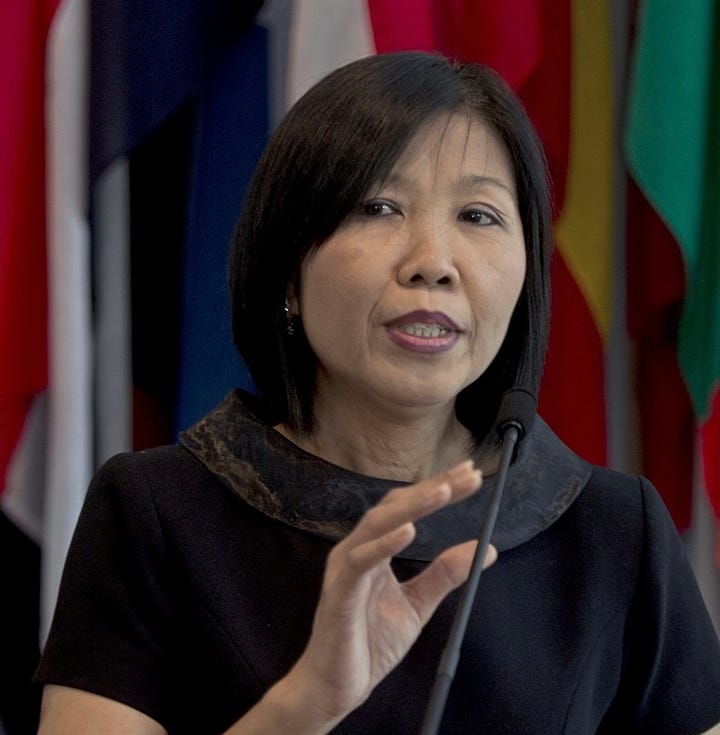
Cambodia’s Diplomatic Power Couple
By Phelim Kine (edited)
China Correspondent Phelim Kine talks to Cambodia’s diplomatic power couple in the U.S. about their roles representing the country at a time when the Biden administration is rallying allies and partners in a global pro-democracy face-off with China and Russia.
In January, the career Cambodian diplomats Sophea Eat and Keo Chhea ended a 14-year stretch of separation in different foreign postings when Eat took a post as the Southeast Asian country’s ambassador to the U.N., moving to the U.S. where her husband Keo has been serving as Cambodia’s top diplomat in Washington since 2022. Their postings coincide with intense U.S. interest in Cambodia and other ASEAN member countries as part of the Biden administration’s efforts to rally regional support for its strategy to counter China in the Indo-Pacific.
That’s no cakewalk for the two envoys. The Biden administration is dismayed by Cambodia’s disqualification of the US backed Candlelight Party from participating in the general election in July 2023. The U.S. is also concerned that Cambodia is building a naval base on the Gulf of Thailand. However, President Joe Biden has also been appreciative of Cambodia’s support for U.S.-backed U.N. resolutions against war in Ukraine.
Keo and Eat have navigated difficult Cambodian foreign ministry internal politics under Prime Minister Hun Sen. Eat began her career that same year in the ministry’s Information Bureau and has risen to positions including Cambodia’s ambassador to Thailand and secretary of State for Asia-Pacific affairs. Keo’s foreign service chops include stints as first secretary in the Cambodian embassies in India and Brunei as well as positions representing Phnom Penh in ASEAN’s headquarters in Jakarta, Indonesia.
I spoke with Keo and Eat about Cambodia’s efforts to balance its relations with China and the U.S., the Cambodian government’s crackdown on foreign interference in the country’s politics, foreign funded media, and the prospects of Hun Manet, entering politics and succeeding his father, Hun Sen as prime minister.
How is the U.S.-Cambodian relationship doing these days?
KEO: It used to be bumpy, but after Cambodia’s successful chairing of the 2022 U.S.-ASEAN Special Summit, and our demonstration of our real position as a neutral country, U.S. politicians understand that we aren’t on the Chinese side and that has improved bilateral relations a lot.
We are not pro-Chinese per se, as the media in the U.S. says, but we need to survive. We believe in relations with the West and the U.S. But where are you? We need to do business with both sides and the Chinese are here, but where is the U.S.? Cambodian children are eager to study in the U.S. And even our leaders, all their children study either in the U.S., Australia or Europe, not in China.
The Biden administration’s Indo-Pacific Strategy aims to explicitly counter China’s influence in the region. How does that affect Cambodia?
EAT: We feel under pressure. We know that the U.S. has great apprehension about China’s increasing power projection, but what we can do is provide some forum for all these powers to come together and work for the common good. We support the Indo-Pacific Strategy or any strategy that promotes peace, stability and progress in the region.
What we cannot accept is any strategy that would harm progress and stability in the region. We hope that the Indo-Pacific Strategy will avoid forcing us in a corner. We are trying to be friends with everyone. The Chinese provide a lot of investment in terms of infrastructure, and the U.S. is our largest market, so we need both to coexist and benefit equally. Cambodia is seen as a Chinese client state, but it’s just a small boat trying to maneuver in a sea of many big ships.
The U.S. is concerned that the Chinese government is developing Cambodia’s Ream Naval Base into a platform for the Chinese military. What do you say to that?
Keo: We are not going to allow them to build any naval base in our country. It’s against our constitution. And our prime minister in a meeting at the White House declared that Cambodia will never allow any Chinese naval base.
The Cambodian government has banned the main opposition party from competing in the general election in July, sentenced its leader Kem Sokha to 27 years in prison on what the U.S. says are politically motivated treason charges and has shuttered most of the country’s independent media outlets. How do you defend that record?
EAT: I’ve lived in this world for nearly six decades and gone through many different regime changes and lots of suffering, including genocide. I have gone through times when we did not have human rights at all during the Khmer Rouge time. So look around to see if there is anyone better than Hun Sen right now. I would vote for anyone who could do better than him.
But we are careful about drastic change. And Cambodia is not led by just one man.
Cambodia’s status as a one-party authoritarian state puts it on the wrong side of Biden’s narrative of a global “battle between democracy and autocracy.” How do you navigate that as Cambodia’s official representatives in the U.S.?
EAT: If you look at Cambodia compared to the U.S. or Sweden, Cambodia may not have the best record in terms of democracy. But if you compare Cambodia to other countries in the region, we’re not so bad.
KEO: We are moving toward democracy. We still make mistakes. There are still some rough issues. It looks authoritarian to you, but we need to educate our people first.
People understand about their own rights, but they forget about their neighbors’ rights, that by accessing their own rights, they are encroaching on their neighbors rights. So we have to implement a law to stop that. Does that mean we are authoritarian?
[Some journalists] use their media identity to blackmail traders along the road. That’s why the government says “You are not policemen — you are media. You can write whatever you want, but don’t ask people for money.” That’s why we stopped that kind of media.
Prime Minister Hun Sen warned foreign diplomats in April that if they have contacts with Cambodia’s now-banned opposition Cambodia National Rescue Party that they should “break diplomatic relations” with Cambodia. And he declared last month that such contacts “insult me, insult my sovereignty.” As career diplomats, how do you feel about Hun Sen’s hostility toward foreign diplomats?
KEO: He’s a man of the people. And he speaks the people’s language. He doesn’t speak politicians’ language. That’s how he connects with the people.
It appears that Hun Sen is prepping his son Hun Manet to succeed him, putting Cambodia on a path to becoming a North Korea-like dynastic authoritarian state. How healthy is that for Cambodia?
EAT: If Hun Manet does well, if he can win the support of the people, why can’t he become prime minister? Like children of other leaders around the world — I believe the U.S. had a leader whose father was a leader called Bush. We may have President Biden’s children becoming president of the U.S. someday, who knows? Just because Hun Manet is the son of the leader and may become the future leader, I don’t say this is wrong.
How easy or difficult is it to be husband and wife diplomats representing Cambodia in the U.S.?
EAT: Our postings in different countries separated us for a very long time — 14 years. We didn’t have much time to strengthen our relationship. Separation can break or strengthen your relationship. The good thing about us being stationed in the same country is that we can consult each other. The bad thing is that we never really have time together. It’s very difficult because of our jobs — we always have a lot to do.
KEO: It’s also a benefit to the U.S. The State Department can call me and say “Hey, can you ask your government to support this U.N. resolution that we proposed?” I then talk to my headquarters and then I talk to her and tell her “Be alert — the U.S. is asking us to support their resolution.”
Read more here.
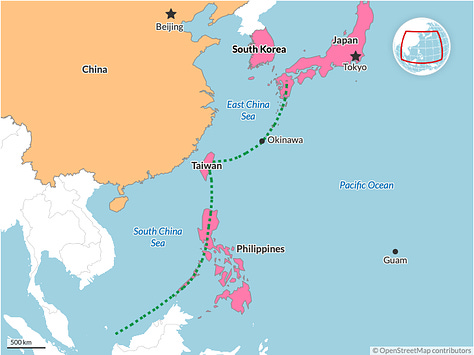
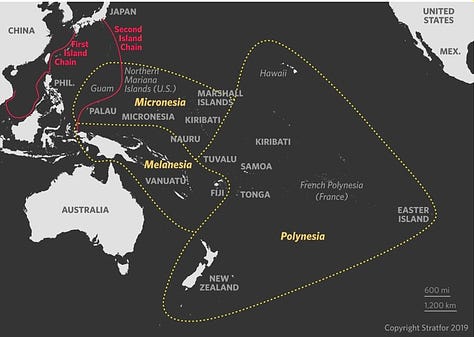
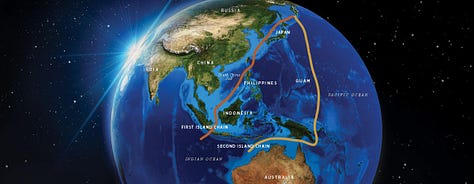
First Island Chain Trilateral
US National Security Advisor Jake Sullivan, National Security Advisor Akiba Takeo of Japan, and National Security Advisor Eduardo Año of the Republic of the Philippines gathered for the first time on 16 June 2023 in Tokyo, Japan to exchange views on a concrete approach for improving trilateral cooperation.
Mr. Akiba and Mr. Año welcomed Mr. Sullivan’s reaffirmation of the United States’ ironclad alliance commitments to both Japan and the Philippines. Recalling the security environment discussed in the recent Japan-United States, Japan-Philippines, and United States-Philippines summit meetings, the three National Security Advisors (NSAs) reaffirmed the importance of deepening trilateral cooperation among Japan, the United States and the Philippines, which share fundamental values of freedom, democracy, and respect for human rights, in order to maintain and strengthen a free and open international order.
The three NSAs emphasized the importance of enhancing trilateral cooperation and response capabilities based on the Japan-United States Alliance and Philippines-United States Alliance in order to maintain peace and stability in the Indo-Pacific region. Also, they concurred that a free and open maritime order, characterized by freedom of navigation, and a free, fair, and equitable economic order are essential in the Indo-Pacific, especially given unilateral attempts to change the status quo by force or coercion. The three NSAs discussed a wide range of regional security challenges, including with respect to the South China Sea and the East China Sea, as well as North Korea. In addition, they reiterated the importance of peace and stability across the Taiwan Strait.
The three NSAs confirmed plans to enhance trilateral cooperation as reflected below:
Efforts to enhance trilateral defense and security capabilities
The three NSAs discussed opportunities to conduct combined maritime activities including multilateral joint naval exercises in Indo-Pacific waters in support of freedom of navigation, and the broader rules-based order.
The three NSAs resolved to advance trilateral defense cooperation based on the recent progress between the United States and the Philippines such as the four additional locations identified pursuant to their Enhanced Defense Cooperation Agreement and between Japan and the Philippines in discussing frameworks that will enhance and facilitate reciprocal visits of defense and military officials.
Efforts to maintain a free and open maritime order
The first trilateral joint training among the three countries’ coast guards was conducted in early June and the three NSAs reaffirmed the importance of such activities.
The three NSAs reaffirmed the importance of efforts to promote Maritime Domain Awareness (MDA) by utilizing Japan’s new “Official Security Assistance (OSA)” cooperation framework, the QUAD’s Indo-Pacific Partnership for Maritime Domain Awareness (IPMDA) and other capacity building measures.
Efforts to enhance trilateral cooperation on humanitarian assistance and disaster relief
The three NSAs resolved to deepen trilateral cooperation in the area of humanitarian assistance and disaster relief (HA/DR), drawing on their military and civilian HA/DR capabilities.
Efforts to maintain a free and equitable economic order
The three NSAs resolved to make common efforts to promote economic security and economic resilience.
The three NSAs affirmed their commitment to addressing economic coercion in coordination with other partners.
The three NSAs decided to convene additional trilateral exchanges in the coming months among the National Security Secretariat of Japan, the National Security Council staff of the United States, and the National Security Council Secretariat of the Philippines, to further expand cooperation and information-sharing.
Read more here.




